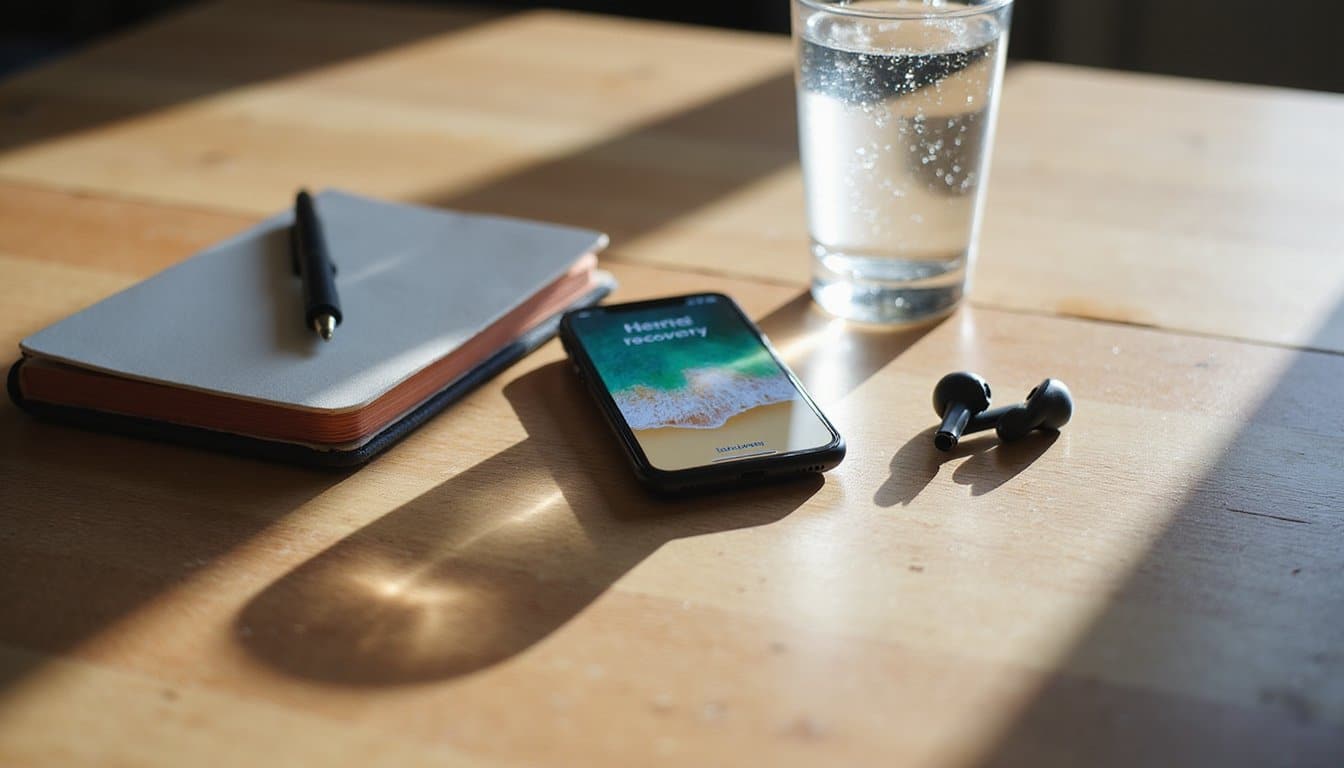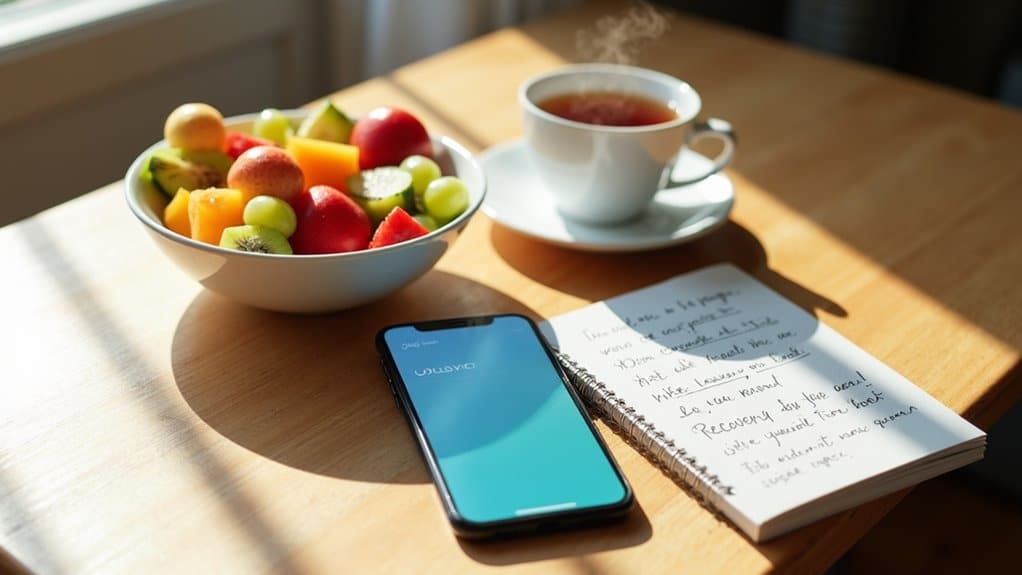Leading eating disorder recovery apps like Recovery Record, Brighter Bite, and Rise Up + Recover provide essential support through evidence-based tools and clinical oversight. You’ll find secure provider communication, personalized meal planning, CBT interventions, and progress tracking features that bolster your treatment process. These digital platforms bridge gaps between clinical sessions while offering real-time coping strategies and community support. Understanding each app’s unique features will help you choose the most effective companion for your recovery path.
Why Recovery Apps Matter in Modern Treatment

Why have eating disorder recovery apps become an essential component of modern treatment? These digital solutions bridge critical gaps in care delivery while enhancing treatment outcomes through holistic clinical integration. You’ll find that apps provide scalable, accessible support, especially if you’re facing geographical barriers or specialist shortages. A new study shows that personalized content in apps leads to better remission rates than generic approaches. Studies indicate that incorporating social networking features could improve recovery outcomes through peer support connections.
Research shows that digital interventions can significantly improve your recovery journey. Through personalized relapse prevention strategies and real-time monitoring, you’re more likely to maintain consistent engagement with your treatment plan. The data demonstrates that app-augmented care correlates with reduced emergency visits and improved outpatient utilization. Studies indicate that patients using app-augmented treatment showed improved weight gain in underweight categories. You’ll benefit from features like automated meal reminders, customized coping strategies, and multilingual support that adapt to your specific needs. For tech-savvy individuals especially, these apps offer an evidence-based pathway to sustained recovery.
Recovery Record: The Gold Standard in Digital Support
Recovery Record stands out as an extensive digital platform that seamlessly integrates clinical oversight with personalized recovery tools you’ll use daily. You can track your progress in real-time through secure data sharing with your treatment team, while accessing customizable meal logs, coping strategies, and therapeutic exercises. The app’s evidence-based features, including CBT principles and secure provider communication, make it a crucial bridge between clinical sessions and your day-to-day recovery path. This innovative platform makes self-monitoring more convenient than traditional paper methods, enhancing adherence to treatment recommendations. Getting started is straightforward with instant setup available on multiple devices. With its impressive 4.8 star rating, backed by over 1,500 user reviews, the app has proven itself as a trusted companion in eating disorder recovery.
Comprehensive Clinical Integration Features
Leading the evolution of eating disorder treatment technology, Recovery Record’s extensive clinical integration features set new standards for digital therapeutic support. Through advanced data visualization capabilities and customizable treatment plans, clinicians can now deliver personalized care with unprecedented precision and engagement.
The platform’s core strengths include:
- HIPAA-compliant messaging that enables secure, real-time communication between you and your treatment team
- Evidence-based intervention tools incorporating CBT and acceptance strategies for managing recovery challenges
- Comprehensive monitoring systems that track your progress through dynamic charts and clinical insights
You’ll benefit from a multidisciplinary approach where your entire care team stays synchronized, reviewing your logs and adjusting treatment strategies based on real-world data. This integrated support system guarantees you’re receiving responsive, personalized care aligned with your recovery goals. To maximize effectiveness, patient-clinician collaboration is essential in determining how specific app features can best support individual treatment needs.
Real-Time Progress Tracking
Building on the powerful clinical integration framework, real-time progress tracking stands as a cornerstone of Recovery Record’s therapeutic effectiveness. You’ll gain immediate self-awareness through AI-powered meal logging, allowing you to document specific food items, thoughts, and emotional states as they occur. This real-time user accountability helps you identify patterns and triggers while maintaining consistent engagement with your recovery expedition. The app’s HIPAA compliant platform ensures your personal health data remains secure and protected. Optum care teams can stay continuously updated on your progress through the dedicated clinician app.
The app’s evidence-based structure incorporates CBT principles and over 200 coping strategies, enabling you to track progress across essential recovery domains. Through customizable Likert-type scales and detailed logging options, you’ll capture nuanced data about your experiences. Your care team can review these insights asynchronously, providing timely feedback and adjusting treatment plans based on your documented progress.
Personalized Recovery Support Tools
Digital support reaches new heights through Recovery Record’s extensive suite of personalized tools, integrating evidence-based therapeutic features with customizable tracking options. You’ll find adaptive strategies that align with your unique recovery path, from personalized interventions based on CBT principles to customizable meal plans and coping techniques.
The app’s comprehensive personalization features include:
- Customizable self-monitoring forms and clinical goals tailored to your specific eating disorder type and recovery stage
- Real-time access to personalized coping strategies and therapeutic interventions when facing emotional challenges
- Individual goal-setting options across multiple categories, including meal management, prevention, and appointment planning
This evidence-based approach guarantees you’re receiving targeted support that evolves with your progress, backed by secure clinical integration and professional oversight when needed.
Brighter Bite: Mindful Eating Made Simple
Brighter Bite’s intuitive meal planning interface helps you establish structured eating patterns while reducing anxiety around food choices. You’ll find daily mindfulness check-ins that encourage present-moment awareness during meals, incorporating proven therapeutic techniques to address disordered eating thoughts. The guided audio meditations are designed to enhance your mindfulness practice throughout the day. The app’s progress tracking feature monitors your expedition through customizable metrics, allowing you to celebrate small triumphs and identify areas where you might need additional support. The app integrates key elements of cognitive behavioral therapy to help reshape negative thought patterns around eating. Access to Coping Chat provides over 20 therapeutic techniques to support you through challenging moments in your recovery journey.
Intuitive Meal Planning Tools
Three key innovations make intuitive meal planning tools essential for eating disorder recovery: AI-driven personalization, seamless health platform integration, and mindful eating facilitation.
Modern apps support your recovery path through sophisticated recipe personalization and macro balancing features that adapt to your unique needs. With 76.07% female users, these platforms have been carefully designed to address gender-specific recovery challenges and nutritional needs. You’ll find tools that utilize daily reminders to boost engagement and consistency in your recovery journey. The integration with smart technology allows users to follow plant-based diets and other dietary preferences with expert guidance.
- Track up to 84 individual nutrients while maintaining a non-judgmental approach to food choices
- Sync with over 50 health platforms to provide extensive wellness monitoring
- Generate customized meal plans from 100,000+ recipes that respect your dietary requirements
These digital tools help reduce anxiety around meal planning while promoting sustainable eating habits. Research shows 70% of users report improved eating behaviors within three months, making these apps valuable allies in your recovery process.
Daily Mindfulness Check-Ins
Regular mindfulness check-ins transform how you relate to food, thoughts, and emotions during eating disorder recovery. Through personalized mindfulness guidance, you’ll develop stronger awareness of hunger cues and emotional triggers while reducing automatic negative thinking patterns.
Research shows that daily mindfulness practice considerably improves your ability to observe experiences without judgment and respond thoughtfully rather than reactively. These emotion regulation techniques help disrupt the cycle between negative self-evaluation and disordered eating behaviors. You’ll learn to recognize and process feelings without turning to compensatory behaviors.
Studies confirm that consistent mindfulness check-ins reduce anxiety, depression, and body image concerns while building emotional resilience. The structured, accessible format of app-based mindfulness tools supports your sustained progress by making these evidence-based practices part of your daily recovery routine.
Supportive Progress Tracking
Detailed progress tracking serves as a cornerstone of eating disorder recovery through Brighter Bite’s integrated monitoring system. You’ll gain valuable food journal insights through extensive behavioral tracking that combines mood states, eating patterns, and therapeutic progress in one accessible platform.
- Record daily meals, emotions, and behaviors in your digital food diary while tracking triggers and thought patterns
- Monitor your recovery path through assessment tests and visual progress graphs that highlight patterns and improvements
- Export detailed PDF reports to share with your treatment team, enabling more focused therapeutic discussions
The app’s evidence-based approach integrates CBT, DBT, and ACT principles into your tracking experience, helping you build self-awareness and identify areas for growth. Your data remains secure and organized, allowing you to focus on meaningful recovery milestones.
Rise Up + Recover: Community-Driven Healing
The Rise Up + Recover app harnesses the power of community support to create a therapeutic environment for eating disorder recovery. With a global user base exceeding one million, the platform fosters inclusive community engagement through shared experiences, motivational content, and peer validation.
You’ll find the app integrates seamlessly with your professional treatment plan, allowing collaborative progress reviews through exportable PDF summaries of your logs and check-ins. The community forums provide emotional support while maintaining privacy through customizable security features. Based on cognitive-behavioral therapy principles, you can access evidence-based coping tools, mindfulness exercises, and psychoeducational resources directly within the app. As a free platform requiring no login, Rise Up + Recover guarantees accessibility while emphasizing its role as a supplement to, not replacement for, professional treatment.
Recovery Warriors: Comprehensive Tracking Tools

Recovery Warriors equips you with sturdy meal and mood logging capabilities that help you identify patterns in your eating behaviors and emotional states. Through clear progress visualizations, you’ll track meaningful changes over time while gaining insights into your recovery path. The app’s personalized coping strategy tools provide evidence-based interventions customized to your specific challenges, supporting you between clinical sessions.
Meal and Mood Logging
Modern meal and mood logging features in Recovery Warriors apps provide extensive self-monitoring tools that support eating disorder treatment. With proper clinician oversight requirements and attention to data privacy concerns, you’ll gain comprehensive insights into your eating patterns and emotional states.
The app’s tracking capabilities include:
- Recording food types, meal times, and contextual factors around eating episodes
- Monitoring emotions, energy levels, and affect using customizable scales
- Documenting thoughts, urges, and cognitive patterns through freeform entry
Your logged information helps clinicians review trends and adjust treatment plans remotely through secure dashboards. Research shows these digital tools increase adherence compared to traditional paper methods, with some patients logging hundreds of entries across their recovery expedition. The system’s high-frequency capability supports thorough self-monitoring while maintaining therapeutic accountability.
Progress Visualization Features
Powerful progress visualization features within Recovery Warriors’ digital toolkit transform complex recovery data into clear, actionable insights. You’ll track your path through interactive charts and dashboards that display trends in urges, completed meals, and emotional states, while receiving real-time feedback on your progress.
The app’s goal achievement visualization helps you monitor specific clinical milestones through color-coded indicators and virtual rewards. You’ll earn badges and points for consistent engagement, while automated insights identify patterns in your recovery trek. Your progress data can be securely shared with your treatment team, enabling collaborative care adjustments.
These visual tools support your cognitive-behavioral therapy by highlighting achievements, regardless of your recovery pace, while providing clinician-customizable insights to guide your next steps and reinforce positive behaviors.
Personalized Coping Strategy Tools
Through dynamic personalization algorithms, the detailed tracking tools within Recovery Warriors deliver targeted coping strategies based on your unique triggers, behaviors, and emotional patterns. The app’s customized reminders help you maintain consistent meal timing and self-care routines while facilitating data-driven refinement of your personalized recovery toolkit.
Key features enable you to:
- Track strategy effectiveness and receive real-time feedback on implementation
- Communicate directly with your treatment team to adjust coping responses
- Set personalized goals with visual progress tracking and milestone rewards
The platform’s secure data sharing supports evidence-based treatment adjustments, while gamification elements encourage regular engagement. This combination of clinical support and engaging features helps you build sustainable coping skills suited to your specific recovery process.
Jourvie: European Innovation in Recovery Support

As a pioneering European initiative in eating disorder support, Jourvie has emerged as a significant digital health solution since its launch in Germany. The app prioritizes data privacy with strict GDPR compliance while offering multilingual accessibility across European markets.
You’ll find evidence-based features developed alongside psychologists, including structured food and emotion diaries, CBT-based coping strategies, and exportable progress reports for your treatment team. The platform’s offline functionality and intuitive interface guarantee consistent access to recovery tools, regardless of internet connectivity.
With over 80,000 downloads in German-speaking regions, Jourvie’s clinical impact is promising. Preliminary studies indicate increased therapy engagement, while users report improved treatment communication and self-monitoring capabilities. The app serves both as a standalone self-help tool and a complement to traditional outpatient care.
MindShift CBT: Managing Anxiety During Recovery
Building on the success of digital recovery tools, MindShift CBT addresses a key challenge in eating disorder treatment: managing co-occurring anxiety. The app’s evidence-based anxiety reduction strategies align with CBT-E principles, offering you personalized support through recovery challenges.
Digital therapy tools like MindShift CBT bridge a crucial gap, combining proven anxiety management with personalized eating disorder recovery support.
Key features include:
- Interactive thought journals and cognitive restructuring tools to disrupt anxiety-fueled eating behaviors
- Guided exposure therapy benefits through progressive challenging of fear foods and body image triggers
- Real-time access to relaxation exercises and coping cards for managing post-meal distress
Research validates digital CBT’s effectiveness, showing comparable anxiety symptom reduction to traditional therapy. You’ll find practical support through MindShift CBT’s tracking features, which reinforce your progress while building essential anxiety management skills that support long-term recovery maintenance.
Choosing the Right Recovery App for Your Journey
Selecting an eating disorder recovery app that aligns with your needs and treatment goals can greatly influence the success of your recovery path. When evaluating options, prioritize apps offering customized onboarding experiences that personalize features to your specific diagnosis and recovery stage.
Consider how well the app supports integrating online and offline support through features like secure clinician messaging and exportable progress reports. Look for extensive tools such as meal logging, mood tracking, and photo documentation that will help you monitor patterns and identify triggers. Recovery Record and Brighter Bite offer these essential features while maintaining strong privacy protection through data encryption and PIN security.
Free access, cross-platform availability, and high user ratings (4.8+ stars) should also factor into your decision, ensuring you’ll have consistent, reliable support throughout your recovery course.
Essential Features That Make Recovery Apps Effective
Effective eating disorder recovery apps incorporate five essential feature categories that work together to support sustainable healing. These evidence-based design principles combine thorough self-monitoring, personalized coping tools, professional integration capabilities, strong privacy measures, and engaging motivational features.
For excellent recovery support, look for apps that offer:
- Detailed meal and emotion logging systems with CBT-based prompts and progress tracking
- Customizable support features, including personalized coping strategies, goal-setting tools, and real-time intervention suggestions
- Secure integration with your treatment team through data sharing, messaging, and progress reporting
These core functionalities create a comprehensive digital therapeutic environment that extends professional care beyond clinical sessions while maintaining privacy and user independence throughout your recovery journey.
Maximizing Your Success With Recovery Technology
Three key strategies can help you optimize the benefits of eating disorder recovery apps while working in the direction of sustainable healing. Initial, engage consistently with self-monitoring features to track meals, symptoms, and triggers, as research shows this leads to significant symptom reduction in 81% of users. Second, utilize the app’s evidence-based interventions and coping tools during challenging moments; they’re designed to disrupt restrictive or binge patterns in real-time. Third, pursue seamless clinician integration by sharing your app data with your treatment team, enabling more informed care decisions. Keep in mind that recovery apps work best as part of an all-encompassing treatment approach, not as standalone solutions. By combining digital support with professional guidance, you’ll optimize your potential for lasting recovery.
Frequently Asked Questions
How Long Should I Use a Recovery App Before Seeing Results?
You’ll likely notice meaningful progress indicators within 8 weeks of consistent app use, with significant improvements typically occurring by week 12. To optimize results, you should engage daily with key features like meal logging and personalized goals during this period. Don’t get discouraged if changes feel gradual; research shows that regular app engagement, especially when combined with clinical support, leads to better outcomes. Stay committed through the initial 12-week period.
Can Recovery Apps Replace Traditional Therapy Sessions Completely?
No, you shouldn’t rely on recovery apps to entirely supplant traditional therapy sessions. Despite their usefulness, app limitations include an inability to provide crisis intervention, complex case management, or deep therapeutic relationships. Research shows the best outcomes occur when apps complement, rather than replace, professional support. You’ll benefit most from using recovery apps alongside traditional therapy, as they’re crafted to bolster, not substitute for, thorough treatment with trained clinicians.
What Happens if I Relapse While Using These Apps?
If you relapse while using recovery apps, don’t panic – it’s a common part of the healing process. You’ll find built-in coping mechanisms for relapse through features like mood tracking and meal planning tools. It’s essential that you keep reaching out for support through the app’s clinician portal or crisis resources. While apps can help monitor warning signs, they shouldn’t be your only source of support; always maintain connection with your treatment team.
Are My Personal Entries and Photos Completely Secure From Hackers?
No, your personal entries and photos aren’t completely secure from hackers in most eating disorder recovery apps. Research shows significant app security concerns, with 89% of these apps failing to meet HIPAA privacy safeguards. Your sensitive data, including photos and journal entries, could be vulnerable to breaches. To protect yourself, you should only use apps with end-to-end encryption, clear privacy policies, and regular security updates. Consider limiting the personal content you share through these platforms.
Should I Tell My Friends and Family I’m Using Recovery Apps?
You’ll need to carefully weigh the benefits of open communication against your personal comfort level. Research shows that sharing your app usage with trusted supporters can improve your recovery path through increased accountability and peer support. However, it’s perfectly valid to maintain privacy if you’re concerned about stigma or judgment. Consider starting with just one or two reliable confidants who have demonstrated understanding of your recovery process.






